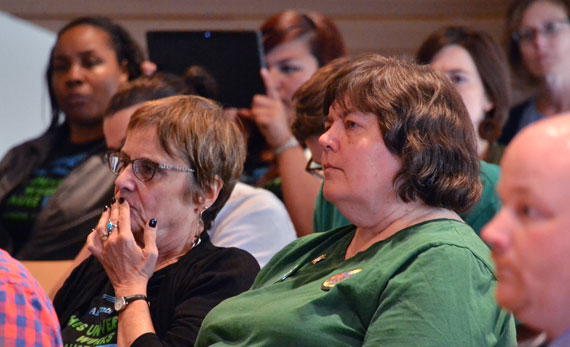

Share
The University of Minnesota is building a caste system that increasingly takes care of those at the top while it pushes lower-paid, frontline workers further and further behind, union activists told the Board of Regents at its June meeting.
“The University’s wage and benefit policies increase the gap between the haves and have-nots, and it’s got to stop,” says Cherrene Horazuk, president of Clerical Workers Local 3800.
Mick Kelly, a cook in Teamsters Local 320, says the university is turning into a world where some sit behind mahogany desks, while others sit on folding chairs.
Local 3800’s Allison Brimeyer called it “institutional feudalism.”
They were among AFSCME and Teamsters workers who spoke to the regents June 12 during a public forum on the university’s proposed budget. Regents will vote on the budget June 24.
The inequities on campus play out in different ways, union activists say: Some you can see in the numbers, some you see in workers’ lives.
Wages
Union research shows that, since 2012, average pay increased more than 6 percent for administrative positions, 4.73 percent for AFSCME clerical positions, and only 2.47 percent for unrepresented civil service positions. The $400,000 raise just announced for basketball coach Rick Pitino, Horazuk says, could pay for an additional 0.5 percent raise for all 1,600 clerical workers in the university system.
Job security
Since 2008, the university has added 1,033 administrative, academic professional, and faculty positions – an increase of 10.8 percent. Meanwhile, it has cut 427 AFSCME clerical, technical, and health care jobs – a decrease of 14 percent. It has also cut 1,130 civil service jobs, a decrease of more than 11 percent.
Benefits
The most blatant discrepancy is that administrators, academic professionals, and faculty get six weeks of paid parental leave, but front-line staff get only two weeks. The university’s pension contribution is nearly twice as much for administrators than it is for unionized and civil service workers.
Everyday trade-offs
The impact on individual lives can be even more telling:
• Local 3800’s Lorraine Haley, who has worked at the university 28 years, says she’s afraid of what will happen after she retires at the end of June. “I’ve been living from paycheck to paycheck for so long that I don’t have a lot of money saved up, and I’m afraid that I won’t be able to make it financially.”
• “For me, my most modest dreams have been put on hold,” says Local 320’s Claire Thiele, who is a lab animal attendant. “Marriage, family, and home ownership are not in the question when you’re cutting a 1998 Mazda Protégé out of your budget.”
• Kelly says one of his food-service co-workers has to scrounge for gas money at the end of every pay period so he can keep getting to work.
• Brimeyer says colleagues come to work sick so they have more days available to use for parental leave.
“I challenge you to find administrators who have to choose between paying a doctor’s bill and buying school supplies for their kids,” Horazuk told the regents. “Many front-line workers make these choices every day.”
Taking it to the bargaining table
The testimony before the regents and a media briefing beforehand are part of the “Raises and Respect” contract campaign being run by AFSCME Locals 3260, 3739, 3800 and 3801, and Teamsters Local 320. Combined, the locals represent 4,000 university workers in clerical, technical, health care, food service, grounds-keeping, research lab, and facilities management positions.
The locals say they want pay raises of 5 percent each year, a minimum campus wage of $15 an hour, increases at the top of the pay scale for long-time workers, and full restoration of the Regents Scholarship for campus workers.
“The university administration finds money when it wants to,” Horazuk told the regents. “It has to find money for front-line staff.”

